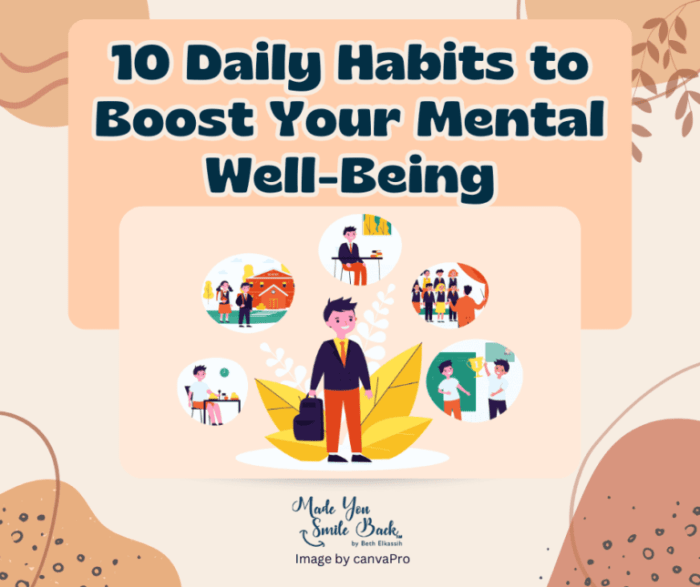Embark on a journey to enhance your physical and mental well-being with these 10 daily habits. This guide is designed to provide you with valuable insights and practical tips to help you lead a healthier and more balanced life.
Delve into the specifics of each habit and discover how simple changes to your daily routine can have a profound impact on your overall wellness.
Introduction to Daily Habits
Daily habits refer to the consistent actions or behaviors that individuals engage in on a regular basis. These habits can range from simple activities like drinking water in the morning to more complex routines like exercising daily. Establishing daily habits is crucial for maintaining both physical and mental wellness as they contribute to overall well-being in a positive manner.
Importance of Establishing Daily Routines
Having daily routines helps individuals create structure and stability in their lives. By incorporating healthy habits into daily routines, such as eating nutritious meals, getting enough sleep, and practicing mindfulness, individuals can improve their physical health and mental clarity. Consistency in these routines can lead to long-term benefits for overall wellness.
Impact of Daily Habits on Well-Being
Positive daily habits can have a profound impact on one's well-being. Engaging in activities like regular exercise, meditation, and adequate hydration can boost energy levels, reduce stress, and improve mood. These habits contribute to a healthier body and mind, enhancing quality of life and overall happiness.
Physical Wellness Habits

Physical wellness habits are essential for maintaining a healthy body and mind. By incorporating these habits into your daily routine, you can improve your overall well-being and quality of life.
1. Regular Exercise
Engaging in regular exercise, whether it's cardio, strength training, or yoga, can help improve your physical health in numerous ways. Exercise helps to strengthen muscles, improve cardiovascular health, boost mood, and increase energy levels.
2. Balanced Nutrition
Eating a balanced diet rich in fruits, vegetables, lean proteins, and whole grains provides your body with the essential nutrients it needs to function properly. A healthy diet can help maintain a healthy weight, reduce the risk of chronic diseases, and improve overall well-being.
3. Sufficient Hydration
Drinking an adequate amount of water each day is crucial for maintaining proper hydration levels in the body. Staying hydrated helps regulate body temperature, improve digestion, and support overall bodily functions.
4. Quality Sleep
Getting enough quality sleep each night is essential for physical and mental health. Sleep allows the body to rest and repair itself, improves cognitive function, and boosts immune system function.
5. Stress Management
Practicing stress management techniques such as mindfulness, meditation, deep breathing exercises, or engaging in hobbies can help reduce stress levels and promote better physical health. Chronic stress can negatively impact the body, leading to various health issues.
Mental Wellness Habits
Maintaining good mental health is essential for overall well-being. Here are five mental wellness habits that can help promote emotional and psychological well-being, manage stress, and improve mental health.
Practice Mindfulness
- Engage in activities that promote being present in the moment, such as meditation, deep breathing exercises, or yoga.
- Practicing mindfulness can help reduce stress, increase self-awareness, and improve overall mental clarity.
- By staying present and focused on the current moment, you can enhance cognitive function and emotional resilience.
Cultivate Gratitude
- Take time each day to reflect on things you are grateful for, whether big or small.
- Cultivating gratitude can help shift your focus from negativity to positivity, improving overall mood and outlook on life.
- Practicing gratitude has been linked to lower levels of depression and anxiety, leading to better mental well-being.
Stay Active
- Regular physical activity has been shown to have numerous mental health benefits, including reducing symptoms of depression and anxiety.
- Exercise releases endorphins, which are natural mood lifters that can help combat stress and improve overall mental well-being.
- Staying active can also improve cognitive function and boost self-esteem.
Get Adequate Sleep
- Prioritize getting enough quality sleep each night, as lack of sleep can negatively impact mental health.
- Sleep plays a crucial role in cognitive function, emotional regulation, and overall well-being.
- Adequate rest can help improve concentration, memory, and problem-solving skills.
Connect with Others
- Building and maintaining positive relationships with others is important for mental wellness.
- Social connections can provide support, reduce feelings of loneliness, and improve overall mental health.
- Interacting with others can enhance cognitive function, emotional resilience, and lead to greater life satisfaction.
Morning Routine for Wellness
Starting your day with a wellness-focused routine can set the tone for a productive and balanced day ahead. Incorporating physical and mental wellness habits into your morning routine can help boost your overall well-being and increase your energy levels.
Sample Morning Routine
- Begin your day with a glass of water to rehydrate your body after a night of rest.
- Engage in a short mindfulness or meditation practice to clear your mind and set a positive intention for the day.
- Do some light stretching or yoga to wake up your muscles and improve flexibility.
- Eat a nutritious breakfast that includes a balance of protein, healthy fats, and carbohydrates to fuel your body.
- Take a brisk walk or do some form of exercise to get your blood flowing and boost your mood.
Benefits of a Wellness-Focused Morning Routine
Starting your day with a wellness-focused routine can have numerous benefits, including:
- Increased energy levels throughout the day.
- Improved focus and mental clarity.
- Reduced stress and anxiety levels.
- Enhanced mood and overall sense of well-being.
- Establishing healthy habits that can lead to long-term physical and mental wellness.
- Aim to fill half your plate with fruits and vegetables to increase your intake of vitamins and fiber.
- Incorporate whole grains like brown rice, quinoa, and whole wheat bread for sustained energy levels.
- Choose lean sources of protein such as poultry, fish, beans, and legumes to support muscle health.
- Include healthy fats like avocados, nuts, seeds, and olive oil to nourish your brain and promote heart health.
- Plan your meals and snacks for the week to ensure you have nutritious options readily available.
- Opt for whole, minimally processed foods over packaged snacks and meals to reduce added sugars and preservatives.
- Stay hydrated by drinking plenty of water throughout the day to support digestion and overall well-being.
- Listen to your body's hunger and fullness cues to eat intuitively and avoid overeating.
- Cardiovascular exercises such as running, cycling, or swimming help improve heart health and increase endurance.
- Strength training using weights or resistance bands can build muscle mass, improve bone density, and enhance metabolism.
- Yoga and Pilates focus on flexibility, balance, and core strength, promoting relaxation and reducing stress.
- Schedule exercise sessions at a consistent time each day, making it a non-negotiable part of your routine.
- Find activities you enjoy to make exercise more enjoyable and sustainable in the long term.
- Break up workouts into shorter sessions if time is limited, such as taking a brisk walk during lunch breaks or doing quick bodyweight exercises at home.
- Start with deep breathing exercises to center yourself and bring awareness to the present moment.
- Practice mindful meditation by focusing on your breath and observing your thoughts without judgment.
- Engage in body scan meditation to connect with your physical sensations and release tension.
- Identify stress triggers and develop coping strategies such as deep breathing, progressive muscle relaxation, or visualization.
- Establish healthy boundaries to prioritize self-care and avoid burnout.
- Engage in physical activities like yoga, tai chi, or walking to reduce stress and promote relaxation.
- Set a consistent bedtime and wake-up time to regulate your body's internal clock.
- Avoid screens and stimulating activities before bed to promote relaxation.
- Create a calming bedtime routine, such as reading a book or taking a warm bath, to signal to your body that it's time to wind down.
- Ensure your sleep environment is conducive to rest by keeping the room dark, quiet, and at a comfortable temperature.
- Improved cognitive function, memory, and concentration throughout the day.
- Enhanced mood and emotional well-being, reducing the risk of anxiety and depression.
- Optimal physical health, including a stronger immune system and lower risk of chronic diseases.
- Increased energy levels and productivity, leading to better overall performance in daily activities.
- Nurture existing friendships and relationships by regularly reaching out and spending quality time together.
- Join clubs, groups, or organizations that align with your interests to meet like-minded individuals.
- Volunteer in your community to connect with others while making a positive impact.
- Attend social events such as parties, gatherings, or community activities to meet new people and expand your social circle.
- Participate in group fitness classes or team sports to build camaraderie and connections through shared experiences.
- Host gatherings or dinner parties to bring friends and loved ones together in a relaxed and enjoyable setting.
- Engage in activities that bring you joy and relaxation, such as reading a book, taking a bath, or going for a walk in nature.
- Practice mindfulness and meditation to calm the mind and reduce anxiety.
- Set boundaries and learn to say no to things that drain your energy or cause you stress.
- Prioritize sleep by establishing a bedtime routine and creating a restful sleep environment.
- Engage in regular physical activity that you enjoy, whether it's yoga, dancing, or going for a run.
Healthy Eating Habits
Eating plays a crucial role in maintaining both physical and mental wellness. The food we consume provides the necessary nutrients for our bodies to function optimally and supports brain health. Adopting healthy eating habits can have a profound impact on our overall well-being.
Creating a Balanced Diet
Creating a balanced diet involves incorporating a variety of nutrients to support your body's needs. Aim to include a mix of fruits, vegetables, whole grains, lean proteins, and healthy fats in your meals. This ensures that you are getting essential vitamins, minerals, and antioxidants to fuel your body and mind.
Incorporating Healthy Eating Habits
Incorporating healthy eating habits into your daily life can be simple with a few mindful practices. Planning your meals ahead of time, preparing nutritious snacks, and staying hydrated are key strategies to support a healthy diet effortlessly.
Exercise and Movement Practices
Regular physical activity is crucial for both physical and mental wellness. Exercise helps to boost mood, increase energy levels, and improve overall health. Regardless of time constraints, incorporating exercise into your daily routine can have a significant impact on your well-being.
Types of Exercise and Movement
Importance of Regular Physical Activity
Regular exercise not only strengthens the body but also has a positive impact on mental health. Physical activity releases endorphins, the body's natural mood elevators, which can help reduce feelings of anxiety and depression. Additionally, exercise improves cognitive function and can enhance overall well-being.
Incorporating Exercise into Daily Routines
Mindfulness and Stress Management Techniques
Integrating mindfulness practices and stress management techniques into your daily routine can significantly improve your mental wellness. These techniques can help reduce anxiety, enhance emotional regulation, and promote overall well-being.
Mindfulness Practices
Stress Management Techniques
Quality Sleep Habits
Quality sleep plays a crucial role in both physical and mental well-being. It is during sleep that our bodies repair and rejuvenate, helping to maintain overall health. Lack of quality sleep can lead to a range of health issues, including weakened immune function, increased stress, and even cognitive impairment.
Establishing a Bedtime Routine
Benefits of Prioritizing Quality Sleep
Social Connection and Community Engagement
Building and maintaining social connections is crucial for enhancing both physical and mental health. Engaging with others fosters a sense of belonging, reduces feelings of isolation, and provides emotional support, all of which contribute to overall well-being.
Ways to Foster Meaningful Relationships
Activities to Promote Social Connection
Self-Care Practices
Self-care is essential for maintaining a healthy balance in life. It involves taking intentional actions to prioritize your physical, emotional, and mental well-being. By incorporating self-care practices into your daily routine, you can improve your overall quality of life, reduce stress, and prevent burnout.
Variety of Self-Care Practices
Significance of Self-Care
Self-care rituals play a crucial role in improving overall well-being by helping individuals recharge, relax, and rejuvenate. When you prioritize self-care, you are better equipped to handle life's challenges, maintain a positive outlook, and prevent burnout. By taking time for yourself and engaging in activities that nourish your body, mind, and soul, you can cultivate a sense of balance and resilience that enhances your overall quality of life.
Summary
In conclusion, incorporating these daily habits into your life can lead to significant improvements in both your physical and mental health. By prioritizing self-care, healthy routines, and mindful practices, you are taking proactive steps towards a happier and more fulfilling lifestyle.
FAQ Section
How long does it take to see the benefits of these daily habits?
Consistency is key when implementing these habits. You may start to feel some positive effects within a few weeks, but long-term benefits usually become more noticeable after a few months of consistent practice.
Can these habits be adapted to fit a busy schedule?
Absolutely! These habits are flexible and can be tailored to suit your lifestyle. Even small adjustments to your daily routine can make a significant difference in your overall well-being.
Are there any recommended resources for further exploration of these habits?
There are plenty of books, online articles, and apps dedicated to each of these habits that can provide more in-depth knowledge and guidance. Feel free to explore and find what works best for you.








![Trulicity Eye Side Effects Lawsuit [2025 Update] | King Law](https://wellness.genpi.co/wp-content/uploads/2025/10/Trulicity-Side-Effects-Common-Serious-Long-term-120x86.png)





